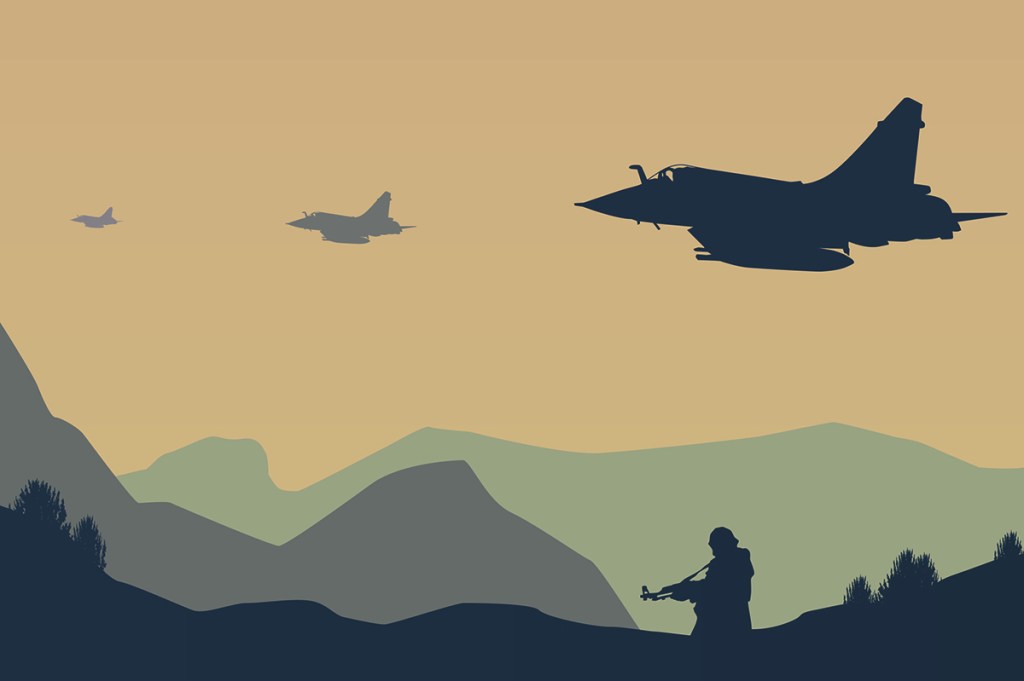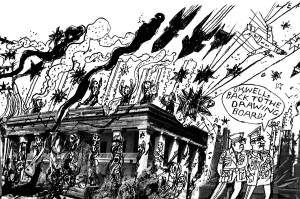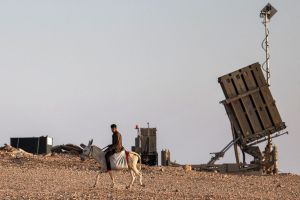Day by day, you could almost see America’s moral authority draining away in Iraq. The weapons of mass destruction that the US had invaded the country to find didn’t exist. And it sometimes seemed as if a monstrous trick had been played on American troops: they were promised a welcome with ‘flowers and sweets’; they got roadside bombs and suicide attacks. In 2004, a year after the invasion, a 19-year-old Marine — outside the US for the first time in his life — looked up at a minaret sounding the call to prayer and asked me: ‘What are they saying? “Kill Americans?”’ The Marine’s platoon was commanded by an officer named Ilario Pantano, who gave me a memorable description of the War on Terror: ‘I’m a New Yorker and 9/11 was a pretty significant event for me,’ he said. ‘Our duty as Marines is, quite frankly, to export violence to the four corners of the globe, to make sure that this doesn’t happen again.’
This was an interesting choice of words because, at the time, 2nd Lt. Pantano was being investigated for killing two Iraqi prisoners, something I didn’t know when I spoke to him. A few weeks later he became the first member of the US armed forces in Iraq to be charged with murder, two counts. The charges would later be dismissed; even so, the case revealed a lot about what had gone wrong in Iraq.
Pantano’s platoon were working in the Sunni badlands near Fallujah, the heart of the growing insurgency. They got intelligence that a farmhouse was being used by ‘Ali Baba’, the insurgents. Inside, they found three AK-47s — nothing unusual in rural Iraq — but also what they described as stakes for aiming mortars. A white car was spotted driving away and Pantano yelled for it to stop. His men fired warning shots and two Iraqis wearing what the Marines call ‘man dresses’ got out, their hands in the air.
The men were put in plastic handcuffs but later Pantano ordered them to be released and motioned for them to search the car while he watched. Two other Marines were standing guard, looking outwards, their backs turned. They heard Pantano shout ‘Kuf! Kuf!’— ‘Stop! Stop!’— and then they heard the sound of automatic fire. One of the two Marines standing guard accused Pantano of carrying out an execution and reported the shooting, which led to an investigation. But the senior officer who reviewed the resulting charges accepted Pantano’s statement that the men had moved towards him in a way he found threatening. The killings were ruled self-defense. Pantano was still criticized for leaving the bodies on display with a sign that said ‘NO BETTER FRIEND, NO WORSE ENEMY’ — the motto of the Marines’ commanding general in Iraq, James Mattis. Pantano had emptied almost two clips of M-16 ammunition into the men, continuing to fire after they were dead. He said: ‘I was sending a message.’
Pantano had been a Marine in the first Gulf War in 1991, a scout sniper. He’d left, gone to college, and become a trader at Goldman Sachs on Wall Street. Then, after the attacks of September 11, 2001, he joined up again. The grunts had a name for officers like Pantano, ‘motarded’, motivated to such an extreme it was almost ‘retarded’. When I met him, he was certainly intense, always wired, always waiting for the next ambush. One hundred and forty-eight Americans died in Iraq in the month that Pantano shot the two Iraqis. He didn’t want the insurgents to put his men in a ‘kill box’.
At the same time, the US military in Iraq were engaged in a hearts-and-minds campaign. Pantano told me then: ‘If we can bring some comfort, some democracy, some opportunity, maybe they won’t hate us so much.’ One day we went to a village where the Marines had paid for a new mosque to be built. The local sheikh came out, all smiles — he’d gotten $10,000 from the Marines — but as we left, kids started throwing stones. I was sitting on the back of a flat-bed Humvee with Pantano. A teenaged boy gave us the middle finger as we went by. Pantano patted the breech of his M-16 and smiled at him. ‘I’ll be seeing you, sweetheart.’ The Marines suspected — in many cases, correctly — that the same people they were giving money to were shooting at them or trying to blow them up. Back in the US, Pantano told New York magazine: ‘I was an idealist until I started seeing our guys in bags.’
Iraq was, as Andrew Bacevich writes, the wrong war. It turned the United States from victim to aggressor. It diverted resources from Afghanistan. It squandered the moral authority conferred by the 9/11 attacks. Elliot Ackerman agrees with that. He’s a veteran of both wars, Iraq and Afghanistan. I first met him when he was in command of a Marine rifle platoon in the battle of Fallujah in November 2004. He tells me that he knew even then that Iraq ‘never made sense’. Afghanistan was the ‘righteous war’, he says, and so losing there feels much worse than the retreat from Iraq. The United States has fought only two wars after an attack on the homeland: World War Two, following Pearl Harbor, which the US won decisively, ushering in the American century, ‘and now September 11, which my generation has lost, and that is a bitter pill to swallow’.
These days, Ackerman is a very fine novelist. He laughs and suggests I want to quote him as a ‘pissed-off vet’. But he is pissed off — at the ‘utter strategic incompetence… and criminal negligence’ that ‘led us into the disaster in Iraq’.
However, contrary to Bacevich, Ackerman believes that Afghanistan was a success: in two decades, there has been no attack on the homeland. Leaving now is a ‘massive self-inflicted wound’ because ‘we’ve already made the down payment to keep Afghanistan from imploding’. It’s not the same war as 10 years ago when there were 140,000 Americans in country; just 3,000 American troops were in Afghanistan when the drawdown started last year. There were three combat deaths in 2020, he says; more were killed in training accidents in the US. America is ‘walking away from Afghanistan and hoping nothing is going to originate from that part of the world that comes back to hurt us’.
I disagree, repeating the well-worn point that you can plot to fly planes into buildings as easily from Hamburg as from Kandahar. As the late Chinese premier Zhou Enlai is misquoted as saying about the French Revolution, it’s ‘too early to say’ what will be the effects of the wars in Iraq and Afghanistan. When Lt. Pantano shot dead his two prisoners, whether or not they were insurgents they both had families who would be intent on revenge. Osama bin Laden understood that very well. He said: ‘My death and the death of others like me will one day awaken millions of Muslims from their apathy.’ The true cost of the disaster in Iraq may still have to be paid.
This article was originally published in The Spectator’s September 2021 World edition.


















